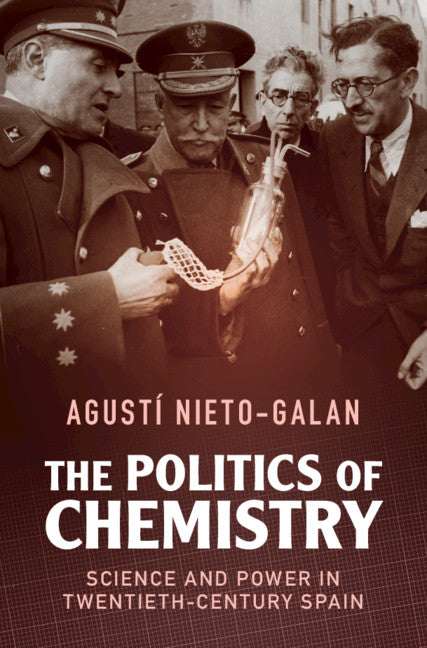Freshly Printed - allow 3 days lead
Couldn't load pickup availability
The Politics of Chemistry
Science and Power in Twentieth-Century Spain
Nieto-Galan examines the political role of chemistry in twentieth-century Spain, enriching understandings of the relationship between science and power.
Agustí Nieto-Galan (Author)
9781108482431, Cambridge University Press
Hardback, published 22 August 2019
308 pages
23.5 x 15.8 x 1.8 cm, 0.63 kg
'… Nieto-Galan's account is very convincing … has not only written an inspiring book on the 'moral ambiguity of chemistry,' but has also contributed significantly to the intersection of science, power, and politics in the twentieth century.' Anna Catharina Hofmann, Technology and Culture
Agustí Nieto-Galan argues that chemistry in the twentieth century was deeply and profoundly political. Far from existing in a distinct public sphere, chemical knowledge was applied in ways that created strong links with industrial and military projects, and national rivalries and international endeavours, that materially shaped the living conditions of millions of citizens. It is within this framework that Nieto-Galan analyses how Spanish chemists became powerful ideological agents in different political contexts, from liberal to dictatorial regimes, throughout the century. He unveils chemists' position of power in Spain, their place in international scientific networks, and their engagement in fierce ideological battles in an age of extremes. Shared discourses between chemistry and liberalism, war, totalitarianism, religion, and diplomacy, he argues, led to advancements in both fields.
List of figures
Preface
Acknowledgments
Chronology
List of abbreviations
Introduction
Biographies of power
A political chemistry
1. Dreams of Modernity
1.1 Cosmopolitanism
1.2 Laboratories and schools
1.3 Useful chemistry
2. A republican science
2.1 A new enlightenment
2.2 Nobel visitors
2.3 The Silver Age of industry
3. War weapons
3.1 A chemical civil war
3.2 A damaged community
3.3 Tortured skills
4. Totalitarian ambitions
4.1 Fascist chemistry
4.2 Chemistry and religion
5. Autarchic ambiguities
5.1 'Our' chemicals
5.2 'Technical' chemistry
5.3 Chemical diplomacy
6. Technocratic progress
6.1 'Neutral' expertise
6.2 Cold war allies
6.3 Corporate chemistry
7. Liberal dissent
7.1 Chemists in exile
7.2 Internal refugees
Conclusion: the moral ambiguity of chemistry
Pure-applied chemistry
Modernisation paradoxes
A troubled identity
Chemists as intellectuals
History and memory
Addendum: Juan Julio Bonet Sugrañes (1940–2006)
Bibliography
Index.
Subject Areas: History of science [PDX], 20th century history: c 1900 to c 2000 [HBLW], European history [HBJD]


